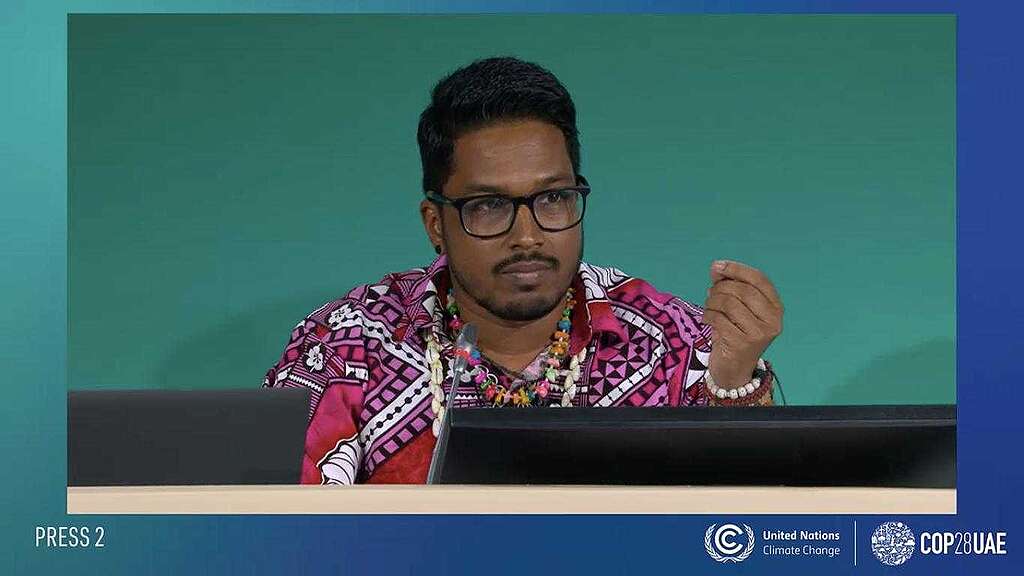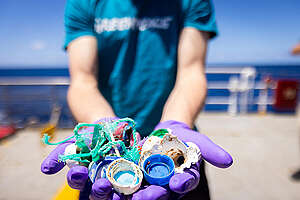The world’s largest climate conference is happening in Dubai this year. Here’s what you need to know.

What is COP28, and why does it matter?
The 28th global climate conference, COP28, has kicked off with growing frustration and doubts about its outcomes. Despite twenty-seven years of meetings and scientific consensus on fossil fuels driving the climate crisis, emissions and global temperatures continue to reach record highs. High emitting countries are still debating whether fossil fuels are the problem, while low-lying island nations in the Pacific battle with the devastating consequences of their inaction.
But COP28 still matters for the simple reason that the most vulnerable communities are still fighting to make sure it does; because they can’t endure another COP filled with incredibly slow progress, complicated processes and broken promises.
Some background
COP, which stands for ‘Conference of the Parties’, is an annual gathering for countries to discuss how to tackle the threat of climate change. The ‘parties’ are the countries that, in 1992, signed the first ever climate agreement known as the United Nations Framework Convention on Climate Change, or the UNFCCC. The Convention requires countries to continue investing in climate research, and most importantly, to limit greenhouse gas emissions which cause accelerated global warming.
In 2015, at COP21, countries signed another landmark climate treaty – the Paris Agreement. For the first time, countries promised to take national action to limit global temperature rise to 1.5 degrees Celsius. The 1.5 target is crucial to avoid the most catastrophic impacts from climate change, especially for low-lying, small island nations like those in the Pacific. To meet this goal, nations agreed on national emissions targets. Since then, a critical discussion point at successive COPs has been to assess progress made towards these targets, and ensure they’re upheld.
Discussions and tensions at this year’s COP
COP28 is taking place in Dubai, United Arab Emirates (UAE). Representatives from 197 nations are attending, as well as other observers looking to influence the summit’s outcomes.
Over the next two weeks, governments will focus on urgently needed measures to address the climate emergency, the most important being a serious commitment from major carbon-emitting countries to phase out fossil fuels. A recent UN report shows that the world is severely off track to meeting the Paris Agreement goals, largely due to the sustained growth of the fossil fuel industry. The report also found a widening gap between governments’ promises of stronger climate action and their national plans.
Talks will also centre on operationalizing the Loss and Damage fund – a historic outcome from last year’s COP, where wealthier nations agreed to financially compensate climate vulnerable states. The concept of Loss and Damage had been championed tirelessly by Pacific advocates as early as 1971. The idea behind it is that developed nations, fueling and benefiting from the climate crisis, should pay for the losses and damages experienced by those most vulnerable and least able to cope with its effects. Pacific Island nations like Vanuatu are already bearing the horrific consequences of climate inaction, with the relocation of six entire towns as a result of extreme weather events.
There’s a lot of controversy and pessimism surrounding this year’s COP because the UAE is among the world’s top ten oil-producing nations that has consistently opposed a rapid fossil fuel phaseout. The appointment of Sultan Ahmed al-Jaber, CEO of a prominent state-owned oil company, as President of the climate talks has only added to concerns. Fossil fuel giants have a well-documented, decades-long history of countering climate science through multibillion dollar disinformation campaigns. They wield enormous influence over government decisions and global policies. This year, the number of fossil fuel lobbyists at the COP has hit an all time high of nearly 2,500 – far outnumbering the number of Pasifika delegates.
COP28 started with controversy last week, as leaked documents revealed plans for secret oil deals, and al-Jaber claimed in the opening days of the conference that there is “no science” behind the need for a fossil fuel phaseout. It is extremely unfortunate that these comments were made, but the COP has moved on and is now focussing on the task at hand: ensuring big climate polluters like Australia listen to the demands of our Pasifika family by making strong climate commitments.
Why COP (still) matters
Each COP is exhausting, complex, and often frustrating. Pasifika delegates and activists have to travel across multiple time zones and many must secure funding support in order to have a seat at the table during these crucial climate talks.
But at the heart of it, it is a privilege to be at COP. It is a privilege to be able to share the stories of communities both in Australia and the Pacific, and to fight for what we hold dear.
What comes out of this COP will affect billions of people across the globe. That is why we must be truly ambitious in our asks whilst addressing the root cause of the climate emergency – the burning of fossil fuels.
Meaningful climate action from world leaders can save lives. In a world where global temperature rise is limited to 1.5 degrees Celsius, people can stay on their lands, practice their own cultures, and speak their own languages. They won’t have to repeatedly rebuild from Category 5 cyclones, king tides, droughts, bushfires, and floods. This is what we are fighting for at every COP, and we will continue to do so.
Our family in the Pacific are feeling the worst effects of the climate crisis, therefore it is Pasifika voices that we must amplify as we pressure the Australian Government to take the most critical step in meaningful climate action: phasing out fossil fuels completely.
Sign the petition to demand the Australian Government stop all new coal, oil and gas projects now.

